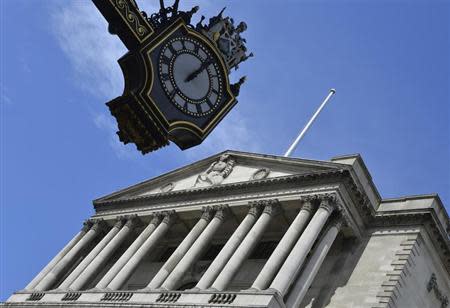BoE backs away from more stimulus as economy picks up
By David Milliken and Christina Fincher LONDON (Reuters) - The Bank moved further away from adding more stimulus to Britain's economy this month and seemed less concerned by rising market borrowing costs, minutes of its latest policy meeting showed on Wednesday. The two current policymakers who in previous months had seen a compelling case for more asset purchases to stimulate activity retreated from this position at the September meeting following signs of strengthening economic growth. The nine-member Monetary Policy Committee (MPC) also chose not to repeat July and August's warning that bond market yields were rising faster the data warranted - a rise the Bank had previously worried might be a headwind to the recovery. It said "promising" data over the past month meant output in the third quarter was likely to be around 0.7 percent, higher than the 0.5 percent it forecast in August. It also predicted growth could strengthen further towards the end of the year. "Over the month the evidence was consistent with a recovery at least as strong as that expected at the time of the August Inflation Report," the minutes said. "Were the recovery to falter, the case for further asset purchases would be stronger. But no member judged that further stimulus was appropriate at present." Policy committee members Paul Fisher and David Miles had voted earlier in the year to restart the central bank's quantitative easing (QE) asset-buying programme. They put their call on hold in July and August pending an assessment of future rate guidance adopted by the new governor, Mark Carney. British 10-year government bond yields surged above 3 percent and sterling hit an eight-month against both the euro and the dollar following the minutes. "Their tone became less dovish," said Scotiabank economist Alan Clarke. "This is a very sensible move. It would have looked like absolute madness to have been thinking about more QE." However, the central bank remains keen to avoid having markets think any rise in official interest rates is imminent while recovery remains in its early stages. Last month Carney unveiled a policy of forward guidance, under which the Bank committed to keep interest rates at 0.5 percent until unemployment falls to 7 percent, unless inflation threatens to get out of control. The central bank forecast that it would take at least three years for unemployment to fall to this level from 7.8 percent - a time scale most in financial markets think is too pessimistic, with a first rate rise priced in for late 2014 or early 2015. In Wednesday's minutes, the BoE said the date at which unemployment falls to 7 percent was highly sensitive to specific assumptions on productivity and labour force participation, and stressed that this would not trigger an immediate rate rise. STRENGTHENING GROWTH The central bank said there were signs that economic recovery was taking hold in Britain, helped by stronger than expected growth in the euro zone, but that downside risks from emerging economies had increased. It noted the rise in short-dated gilt yields could be due to a number of factors, including U.S. market moves, stronger-than-expected British data and potentially the bank's forward guidance policy. On inflation, the MPC judged that none of the criteria that might cause it to suspend its forward guidance on interest rates had been breached. Although a rise in oil prices might push inflation up in the short-term, the outlook for 18-24 months' time had improved due to a 3.5 percent strengthening in sterling over the month. Public inflation expectations were little changed. The Bank's Financial Policy Committee (FPC) could warn the MPC that it needs to raise interest rates to head off a threat to financial stability, but despite signs of rapidly rising house prices in parts of Britain, such a warning is unlikely as the finance committee has other tools to deploy first. The Bank's long-term goal remains to return inflation to 2 percent, without causing unnecessary volatility in growth. Inflation has exceeded 2 percent since December 2009 but has eased over the past two months. (Reporting by David Milliken and Christina Fincher Editing by Jeremy Gaunt)



